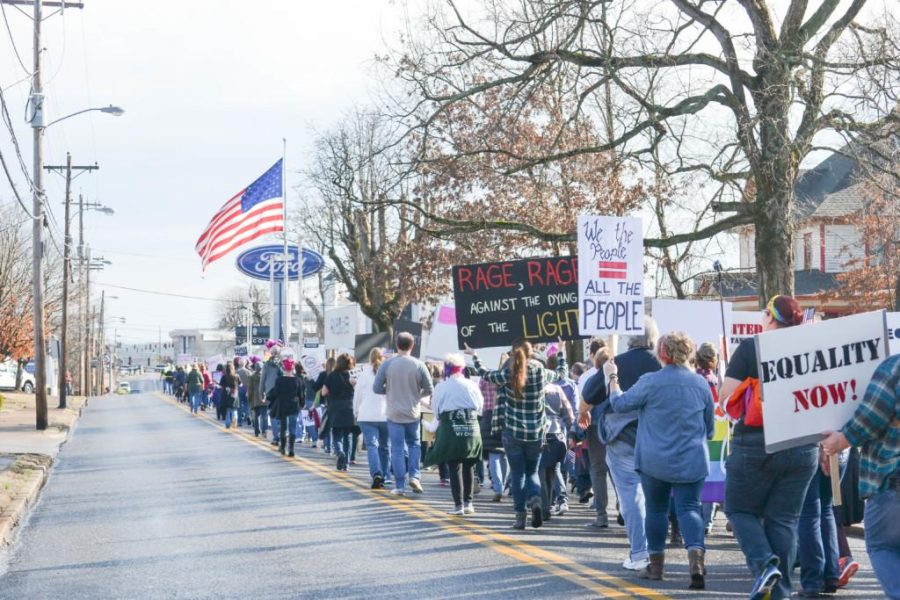Two locals mobilized hundreds. This is how it all happened.
Story by Abby Siegel, News Editor, and Ashley Traylor, Staff writer
For many Americans, Saturday was a day for their voices to be heard regarding issues of equality and social justice.
At least 700 people in the Murray community gathered at Faculty Hall as participants of the March for Social Justice and Equality and a local Women’s March.
Meanwhile, Landen Bates, senior from Shelbyville, Kentucky, marched alongside more than 1 million Americans in Washington as a participant in the national Women’s March on Washington.
Bates said he decided to participate in the march after deliberating for weeks about going with five of his friends from the University of Kentucky. They drove about 15 hours on Friday, ready to rally Saturday morning at 6:30 a.m.
“From the moment we got to the metro station, it was a sea of people,” Bates said. “After two stops, the train was full.”
Bates said there were veterans, people in wheelchairs, children and men and women everywhere, many wearing pink hats and holding creative signs.
He estimated one in every eight participants was a man.
“I think one of the major misconceptions of it was that it was an anti-Trump march, but it wasn’t,” Bates said. “It was pro-women, pro-civil rights and it just so happens that those views intersect with the administration that Trump has made public.”
As a man, Bates said he wanted to march on behalf of the women he knows who he sees as important and full of strength.
“The most memorable part was when we got finished marching and were at the White House, there were all these fences put out in front and everyone was leaning their signs on them,” Bates said. “That was very symbolic – that was the wall we were going to build.”
LOCAL MOVEMENT
Participants of the local march carried signs while strutting to the Court Square that read, “Feminism is another word for equality,” “Losing the popular vote is not a mandate,” “Our rights are not up for grabs,” “God loves everyone. That’s his thing,” “United we stand for social justice,” “America was already great before Trump’s hate” and “Hate does not make America great again.”
Together, participants chanted “This administration must work for everyone’s trust,” “Everyone should have a place, every creed and every race,” “No justice, no peace,” “No to racism, no to bigotry, no to fascism, no to misogyny,” “Clean air, clean water” and “1 2 3 4, love is what we stand for; 5 6 7 8, we don’t want a world of hate.”
The march concluded with live music and speeches in downtown Murray.
Peter Murphy, professor of English, and his wife, Sarah Gutwirth, planned the march, hosting interest meetings in November 2016 after the election results were announced.
Gutwirth said she was proud they could stand in Murray and march in solidarity with the national Women’s March because “sisterhood is powerful.”
“Each and every one of you has the capacity to make change,” Murphy said. “What you see today is a grassroots organizing effort. Two people might have introduced the idea for a march and a rally, but well over 100 showed up to move that idea forward.”
MARCHING FORWARD
The national Women’s March continues through a campaign, “10 Action/100 Days”.
Every 10 days, there will be opportunity to take action on issues the march stood for, according to the Women’s March on Washington website.
The first action is to fill a downloadable postcard and mail it to local senators with thoughts on the issues the march was based on, such as ending gender-based violence, LGBT rights, reproductive rights and women’s health, religious freedom, immigrant rights and civil rights.




























































































